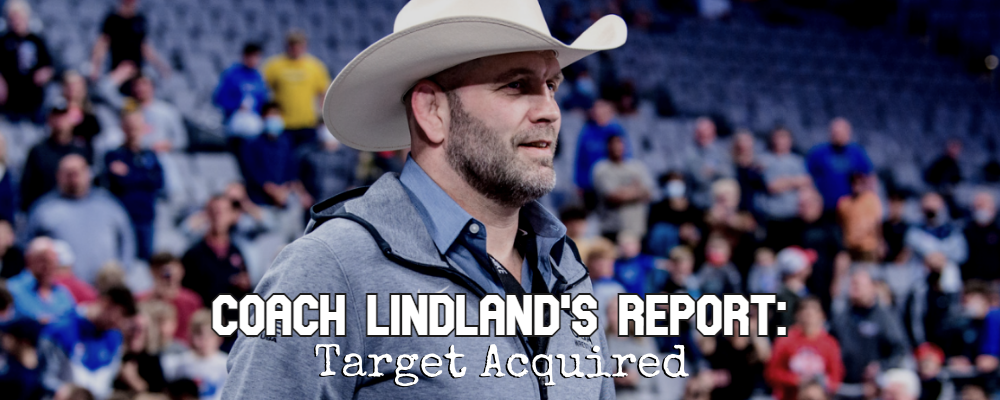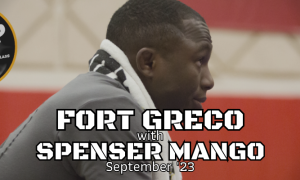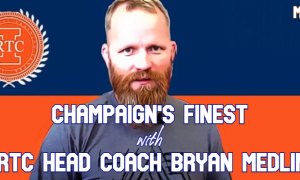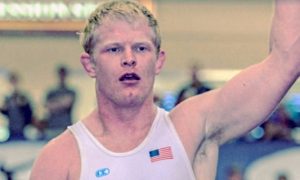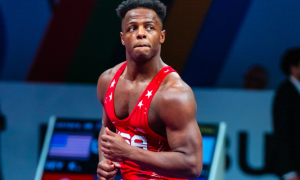Five Point Move is proud to host USA Greco-Roman National Team head coach Matt Lindland each week for Coach Lindland’s Report. Here is where you will find detailed perspectives from Coach Lindland pertaining to recent results, upcoming events, training plans, and other Greco-related news that isn’t available anywhere else. ALSO — if you would like to donate directly to the US Greco-Roman program, just click here. Your support is appreciated!
The first Coach Lindland’s Report of 2022 starts in an appropriate setting: Winter (or “January”) Camp at the US Olympic & Paralympic Training Center in Colorado Springs. A much-discussed gathering it had been. The still-ongoing pandemic prevented camp from being held at the aforementioned OTC last year; and this time around, the US program rolled out the red carpet for age-groupers in a major way, a departure from what is normally an opportunity exclusive to established Seniors.
Naturally, US National Team head coach Matt Lindland addresses the influx of youth who were present in Springs (this report was recorded on Sunday, January 9, three days prior to the camp’s conclusion). Lindland explains how the age-group athletes managed what might have seemed a new environment for some, and why they were invited. In addition are several other topics of note. The overall condition of the collective was seen as a bright spot, and Lindland describes the steps athletes need to take during an intense camp in order to recover. A deep pool of coaches were on-hand, as well, which underscores what was perhaps Lindland’s favorite part of the process. Communication is the priority for the US program, therefore the coach’s optimism is high due to he and his colleagues sharing the same objectives leading to Belgrade ’22 and beyond.
5PM: One of the big details about January Camp for ’22 was the number of younger guys who were invited. A lot of National-type camps include a few age-groupers, but this one saw many more make the cut. How have they handled themselves?
Coach Matt Lindland: That’s what we’ve been trying to do, is to involve more young athletes in Greco-Roman. The only athletes who are here who met those criteria, with a few exceptions, are full-time Greco-Roman athletes. They have left the folkstyle system behind. They are not interested in winning district meets and state titles, or becoming NCAA All-Americans. They do want to get on the podium at the Olympic Games and win World championships for the United States. There are two guys from the folkstyle system who are here, Kodiak (Stephens) and Eli (Pannell), but both were at the Junior Pan-American Games and I can see that they have a real passion for Greco-Roman just having had the opportunity to be in that environment full-time. They played with it, and they are both very good at it. They’ve made Pan-Am teams and won medals. The fact that both wanted to do this during their college seasons I felt was worth using our funds to bring them out here.
We hear all the time how we as a Greco program do not recruit the NCAA athletes. Well, they have to show interest (laughs). It’s hard to convince these wrestlers to try something new when, frankly, they are a little intimidated by our sport. I think it’s great that we are going to do a couple of practice sessions this week with the freestyle team. I’m looking forward to that because we can help each other in different ways. Freestyle is doing a lot of great things right now. They have set a standard that is going to be hard to meet, let alone surpass. But I want our Team to understand that they have the capability to do what freestyle is doing as far as performance. We just have to do the right things to get there.
This camp has shown me — and not just from our younger guys but our veteran guys, as well — that they are willing to take risks. They are willing to make some changes. This is something we’ve talked about a lot, taking risk. It’s the #1 tenet for scoring in our sport. If you’re not willing to risk and try something new, then it is hard to develop that habit of taking risks. Our guys are willing to try something new.
It’s so funny, because it was almost like Bruce Baumgartner read the letter I sent out to prior to this camp. It was all about trying new stuff, experimenting. This isn’t how I do it, but I’m willing to mess with this at least during camp and play around with this situation. When you do that, you get better. I’m seeing this from every one of our athletes here. It is very important to me to try and implement change and take risks. Watching our athletes embracing that right now is really fun.
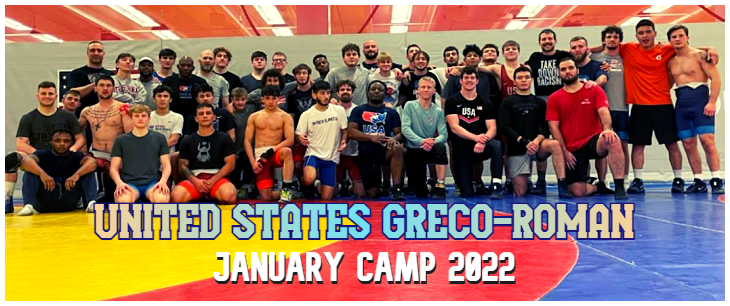
(Photo furnished by Zac Dominguez)
5PM: Like you said, you do have a few college athletes in camp, as well as a group from Northern Michigan. But there are also those who don’t have the same situation, or they might not have had regular practices going on, or maybe haven’t competed in a while. So, as a whole, are you pleased with the shape everyone is in?
ML: I was actually surprised. Everyone seems a little more in-shape than I thought, and I know where most of these guys are at. RaVaughn (Perkins) just got back from an injury, Tracy (G’Angelo Hancock) took a little time off and I have trained with him minimally since Oslo. If they are in worst shape than I thought, then they don’t look like it. They are pushing through every situation. I’m checking with them. I’ll ask, How are you feeling? Some might be tired and sore, but they are getting through it.
Certainly one of our top objectives that we want to hit during camp is to make it through every training session. How do you do that? You recover well, you rest well in between practices, you hydrate. But in order to do all of that means having to take ownership of your training. Camp doesn’t just happen during the two hours when we are on the mat. It is also happening outside of the room. It is using the sauna, the cold plunge. And we have a brand new sauna and cold plunge, and I think the guys are taking every advantage of that. Why? Because that’s part of their training.
5PM: How do you balance objectives for camp — such as building a base and working on different skills — with preparing for impending competition, which is right around the corner in Zagreb later this month?
Coach Matt Lindland: It takes a lot of communication with your coaches and staff, as well as coaches from outside of our staff from the RTC’s (regional training centers) and WCAP (Army’s World Class Athletes Program). We are preparing to try and get to that next level, and then we are putting a plan together on how to do that. It takes getting feedback from everyone in the program and they all have done a really good job of that during this camp. I can’t thank all of the coaches enough for not only supporting my vision, but also for the fact that we are communicating with one another as a coaching program. This is the United States program; it is not WCAP, Sunkist, or New York (NYAC). Really having a program-minded attitude is important and I feel very grateful that is where we are now reaching. I can see it, it has been happening; but a sense of urgency from our program coaches is being preached. I mean, you can see what we are capable of. Now it’s like, We’ve got the guys. We might not have a lot of depth in our program, but we have the right guys who can do this. Most of them are the guys who have met the criteria to get funded and go on National tours. We also have other guys who maybe are not there yet, but they are right on the cusp of that.
We need to lessen the distractions. We have some really talented guys, but they are doing school or have a lot of stuff going on. Bruce Baumgartner shared with our Team — and I was the same way — that while he was competing he had three things: his family, his job that allowed him to wrestle, and wrestling. He didn’t have 12 things going on in his life that he was trying to be great at. I thought that was a really great message he shared, which was, My family supports me to wrestle and the job funds me to be able to wrestle. Like, When I do my job, I’m doing it 100% — but as soon as I step on the mat, I’m 100% focused on wrestling. And once I’m done wrestling, I’m 100% focused on my family.
I thought that was a great message and it was great of Bruce Baumgartner to share some of those things that he learned. And like I was saying earlier, I had talked to some of the guys who were coming out here and I got some really great feedback on my letter. It basically said, Here’s the attitude, here’s what we want to do as far as being willing to take risks and trying new things… Bruce shared the same sort of message, and he also talked about focusing on what’s really important when training at camp — and the guys are doing a great job of that. When they are here, they are focused.
I also think it’s the little things. Coach (Zac) Dominguez a year ago was running camps when COVID was crushing the whole world and I personally could not attend National Team training camps. So, I’d write plans and Zac would put them on an app, and now we’re always running those on an app. I think that allows the athletes to do what they need to do as far as focusing on their technique without worrying about if the coach is checking the clock. Because, they can see it (laughs). They can see it in the room and they appreciate that. It is something that we have integrated into our program. That goes back to something I was saying before: we have coaches who are trying to make our program better, not just their own clubs. It is a big change, and it is nice to see.
5PM: Who are the other coaches besides Zac and the Army who have had been at camp? And how does it work when it comes to running drills, warm-ups, and so on?
ML: We have our National Team staff. We have Herb House, who has been a World and Olympic coach. Then you have all of the club coaches who have been coming in, like Lucas Steldt, who has trained up a bunch of athletes. Coach Dominguez is coming today (Sunday), We were supposed to have Andy Bisek but he had contracted the virus and had to stay home. We have our WCAP coaches here with Dremiel Byers working with our upper-weights.
Everyone here is working towards the same vision. There are times when it is, Okay, Mohamed (Abdelfatah), I want you to run this session, and, Lucas, okay, we’re on the same page, I’m turning this warm-up over to you. I wanted to get Lucas, I wanted to get Andy. Whenever Spenser is in town — and he’s not in town for this camp, and he is missed — I want him in front of the athletes. But as “coaching program” coaches, we are moving in the same direction. We are sharing the same methods, it’s just athletes might be hearing them from a little bit of a different voice. We’re all sharing the same messages, and that goes a long way.
I love some of the stuff Coach (Shon) Lewis has said. He’s like, What are the options? Let’s limit the options. This is what we’re doing with our par terre defense. He was talking about forcing guys to have to lift. Because, if all your opponent can do is lift, then all you have to do is defend the lift and not have to defend the gut. There are different ways of looking at different situations and every one of these coaches brings a lot to the table in that aspect.
5PM: The trip to Europe following camp is not going to be a short one for most of the athletes who are on the roster. It’s a long trip, even compared to the winter of ’19. Could you go over the schedule?
ML: Again, it comes down to having coaches who are program-minded. We’ve talked before about having a “forward operating base” overseas. Maybe we’ll have that someday, or some model of that, but we all agree that we need to get our athletes overseas for an extended period of time. Every program has different ways they operate. For the military, after 30 days you have to do extra paperwork and take extra steps. It just makes things more difficult, so we tried to keep this tour under 30 days. That was something we were looking at doing.
We were looking at getting the most training we could get along with some competition. You have people who are National Team athletes asking, Why aren’t we going to Rome (United World Wrestling “Ranking Series”) or Istanbul (the second “Ranking Series event, both in February). Those are great questions to ask and I’ve had those individual conversations. We are looking to get competition, sure, but it is about where we can get the most training in.
We looked at it, and we have a mini-camp on the front-end of Zagreb. We will then enter that tournament. We’ll have four days of international training, the competition, and then the camp in Porec. Obviously, the training before the tournament as opposed to afterwards will be a little different. It’s a 14-day training camp in the middle of two tournaments. The schedule worked out ideally for us in the United States. A lot of times, the European Championships and the Pan-Ams are a month apart and there are scheduling conflicts.
Another reason why we aren’t going to the ranking events is because they are “scratch weight” (no weight allowance). We are looking to get matches, compete, and train. This is a training opportunity. Competition is to help us figure out where we have made adjustments and then decipher other areas we might have to fix. Yes, we want to get medals, we want to perform. But mindset-wise, the two tournaments (Zagreb and Petrov) are part of the training process to get ourselves ready for what’s ahead of us, and that is in Belgrade (the ’22 World Championships).
5PM: For you yourself, this edition of “January Camp” is not only your first in two years, but it has also almost been two years since the last camp, period, was held at the OTC. How does it feel to be back doing this normal thing?
Coach Matt Lindland: It actually does almost feel like normal, except for the guys who aren’t fully-vaccinated. For the guys who are, it is, Make sure you’re at practice on time. The other guys have more things they have to do and I totally respect their right to do that. And they are doing it by going down and getting tested everyday to make sure that they keep the guys who are vaccinated safe. Because, you can get the virus whether you are vaccinated or not.
It’s great to be back. That’s really all I’ve got to say. I think everyone is happy to be back. You have the dining hall right there, the dorms right there, at the camp you can bring in more folks… Like I said in the first question, you can bring in some of these younger guys who are very interested in being full-time Greco-Roman athletes, and even a few of the college guys who decided that they want to take this opportunity. We are trying to bring everyone in. We are an inclusive program. The Training Center is a great place; but if it shuts down, we know that we can train other places, too. But the short answer is that it’s awesome to be back.

Listen to “5PM50: Mr. Fantastic Benji Peak” on Spreaker.
Listen to “5PM49: Robby Smith on coaching, fatherhood and mentors” on Spreaker.
Listen to “5PM48: Austin Morrow and Gary Mayabb” on Spreaker.
SUBSCRIBE TO THE FIVE POINT MOVE PODCAST
iTunes | Stitcher | Spreaker | Google Play Music

Notice: Trying to get property 'term_id' of non-object in /home/fivepointwp/webapps/fivepointwp/wp-content/themes/flex-mag/functions.php on line 999

